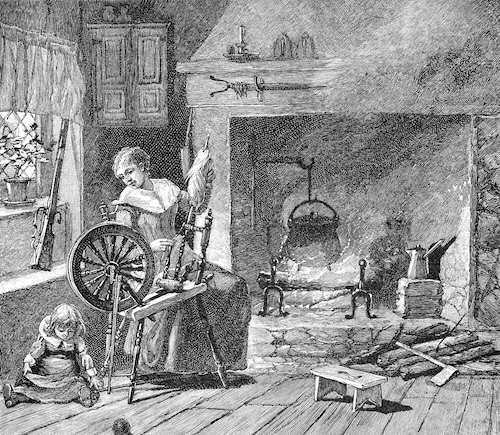In colonial society, women’s daily lives looked very different depending on their class, race, and where they lived. But across the colonies, most women shared a few common experiences: hard work, limited rights, and important roles within families and communities.
Daily Life and Responsibilities
For many women, daily life centered around work in the home. Women cooked, cleaned, tended gardens, made clothes, raised children, and cared for the sick. In farming communities, they often helped plant and harvest crops or managed livestock.
In towns, some women worked alongside their husbands in shops or ran inns or taverns. Widows might take over a family business. In some colonies, especially in New England, women also taught children to read, often using religious texts.
Some free women worked outside the home to earn income. They might serve as midwives, nurses, or laundresses. Most work done by women was unpaid and viewed as part of their family role rather than a job.

Limitations and Challenges
Colonial laws and customs placed many restrictions on women. They could not vote, serve on juries, or hold public office. Married women could not own property or sign legal contracts without their husband's permission. This legal status was called coverture, and it meant that a husband controlled most aspects of a wife’s life.
Women also had little control over major decisions. In most colonies, fathers chose who daughters would marry. Divorce was rare and difficult to get. Education was limited, especially for girls from poor families or enslaved backgrounds.
Some women, especially enslaved and Indigenous women, faced additional hardships. Enslaved women had no legal rights and were forced to work long hours in fields or homes. Native women saw their communities disrupted by colonization, war, and loss of land.
Contributions to Colonial Society
Despite these limits, women played key roles in building and supporting colonial life. They raised children, managed households, passed on cultural traditions, and built strong community networks. In some places, they helped found churches, supported schools, or organized mutual aid. During times of hardship, such as food shortages or illness, women were often the ones holding families and communities together. Their labor, although often overlooked, was essential to colonial survival.
